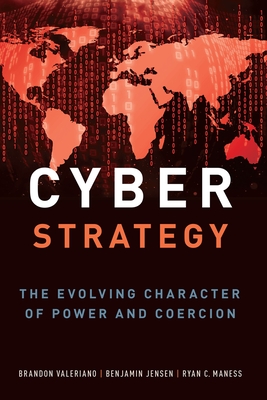Cyber Strategy: The Evolving Character of Power and Coercion

Cyber Strategy: The Evolving Character of Power and Coercion
Some pundits claim cyber weaponry is the most important military innovation in decades, a transformative new technology that promises a paralyzing first-strike advantage difficult for opponents to deter. Yet, what is cyber strategy? How do actors use cyber capabilities to achieve a position of advantage against rival states? This book examines the emerging art of cyber strategy and its integration as part of a larger approach to coercion by states in the international system between 2000 and 2014. To this end, the book establishes a theoretical framework in the coercion literature for evaluating the efficacy of cyber operations. Cyber coercion represents the use of manipulation, denial, and punishment strategies in the digital frontier to achieve some strategic end. As a contemporary form of covert action and political warfare, cyber operations rarely produce concessions and tend to achieve only limited, signaling objectives. When cyber operations do produce concessions between rival states, they tend to be part of a larger integrated coercive strategy that combines network intrusions with other traditional forms of statecraft such as military threats, economic sanctions, and diplomacy. The books finds that cyber operations rarely produce concessions in isolation. They are additive instruments that
complement traditional statecraft and coercive diplomacy. The book combines an analysis of cyber exchanges between rival states and broader event data on political, military, and economic interactions with case studies on the leading cyber powers: Russia, China, and the United States. The authors investigate cyber strategies in their integrated and isolated contexts, demonstrating that they are useful for maximizing informational asymmetries and disruptions, and thus are important, but limited coercive tools. This empirical foundation allows the authors to explore how leading actors employ cyber strategy and the implications for international relations in the 21st century. While most military plans involving cyber attributes remain highly classified, the authors piece together strategies based on observations of attacks over time and through the policy discussion in unclassified space. The result will be the first broad evaluation of the efficacy of various strategic options in a digital world.
PRP: 264.95 Lei
Acesta este Pretul Recomandat de Producator. Pretul de vanzare al produsului este afisat mai jos.
238.46Lei
238.46Lei
264.95 LeiLivrare in 2-4 saptamani
Descrierea produsului
Some pundits claim cyber weaponry is the most important military innovation in decades, a transformative new technology that promises a paralyzing first-strike advantage difficult for opponents to deter. Yet, what is cyber strategy? How do actors use cyber capabilities to achieve a position of advantage against rival states? This book examines the emerging art of cyber strategy and its integration as part of a larger approach to coercion by states in the international system between 2000 and 2014. To this end, the book establishes a theoretical framework in the coercion literature for evaluating the efficacy of cyber operations. Cyber coercion represents the use of manipulation, denial, and punishment strategies in the digital frontier to achieve some strategic end. As a contemporary form of covert action and political warfare, cyber operations rarely produce concessions and tend to achieve only limited, signaling objectives. When cyber operations do produce concessions between rival states, they tend to be part of a larger integrated coercive strategy that combines network intrusions with other traditional forms of statecraft such as military threats, economic sanctions, and diplomacy. The books finds that cyber operations rarely produce concessions in isolation. They are additive instruments that
complement traditional statecraft and coercive diplomacy. The book combines an analysis of cyber exchanges between rival states and broader event data on political, military, and economic interactions with case studies on the leading cyber powers: Russia, China, and the United States. The authors investigate cyber strategies in their integrated and isolated contexts, demonstrating that they are useful for maximizing informational asymmetries and disruptions, and thus are important, but limited coercive tools. This empirical foundation allows the authors to explore how leading actors employ cyber strategy and the implications for international relations in the 21st century. While most military plans involving cyber attributes remain highly classified, the authors piece together strategies based on observations of attacks over time and through the policy discussion in unclassified space. The result will be the first broad evaluation of the efficacy of various strategic options in a digital world.
Detaliile produsului









